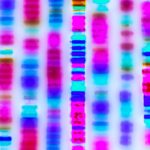Early screening allows for pre-symptomatic interventions and can improve kids’ quality of life.
An early diagnosis of spinal muscular atrophy (SMA) is key, according to new Australian research that shows newborn bloodspot screening improves rates of walking and longer-term quality of life.
The findings offer robust support a nationwide screening program, which was recommended by the federal health department in 2021 and has been adopted by NSW and the ACT so far.
Researchers studied health outcomes for 33 Australian infants and children with SMA in the two years after their diagnosis. Fifteen were diagnosed in the first few days of life using a heel prick blood sample test, and the others were diagnosed after displaying symptoms and being referred to a specialist.
Mortality rates were similar at two years after diagnosis, with 93% of children screened using the heel prick test surviving, compared to 89% in the comparator group.
Of those who survived, 79% of children screened were able to walk alone or with assistance. The remaining children diagnosed with the heel prick test could all stand independently or with assistance.
In contrast, just one child in the usual care group (6%) was walking independently or with assistance two years after diagnosis. More than half failed to reach any significant milestones during the follow-up period, except being able to sit without assistance.
Children in the usual care group also had a seven-fold increase in the odds of requiring non-invasive ventilation or feeding support at the two-year mark compared to those who were screened.
Alarmingly, 40% of children in the screening group displayed SMA symptoms before they were 20 days old, according to findings published in The Lancet Child & Adolescent Health.
“Until recently, SMA was the leading genetic cause of infant mortality worldwide. Many babies born with the severest infantile-onset form of the disease – type 1 SMA – died before their second birthday,” lead author Dr Didu (Sandi) Kariyawasam, a paediatric neurologist from the Sydney Children’s Hospital Network, said in a statement.
Recently developed genetic therapies for kids with SMA are more effective when treatment starts before symptoms develop.
“While the development of genetic therapies has been crucial, having a proactive model for early diagnosis is equally as important as an intervention,” Dr Kariyawasam said.
“The earlier the diagnosis, the earlier treatment can begin, which is where newborn screening comes in,” she said.
The first pilot program for screening in newborns started in NSW and the ACT in 2018. Since then, more than 400,000 babies have been screened for SMA.
Following the success of the pilot program, parents of babies born in these states after 1 July 2022 are offered free SMA screening in their child’s first three days of life.
In 2021, the federal government recommended SMA screening be rolled out nationally. Last year, Western Australia announced a pilot program for SMA screening, and Victoria and Queensland announced their newborn bloodspot screening programs will include testing for SMA from 2023.
“A lot of work has gone into proving the screening program should be the standard of care across Australia, even before the current paper came out,” Dr Kariyawasam told The Medical Republic.
“The Lancet paper is really just icing on the cake.”
However, Dr Kariyawasam emphasised there were challenges before SMA screening was performed for all newborns in Australia, with each state and territory responsible for funding and implementing its own program.
Dr Kariyawasam and her colleagues are establishing a knowledge-sharing consortium to help other jurisdictions learn from the NSW and ACT pilot program.
Dr Kariyawasam also stressed that newborn screening only identified 95% of SMA cases. Consequently, GPs needed to maintain a level of clinical suspicion if they came across a newborn displaying symptoms, even if a negative test was recorded.
The Lancet Child & Adolescent Health 2023, online 17 January





